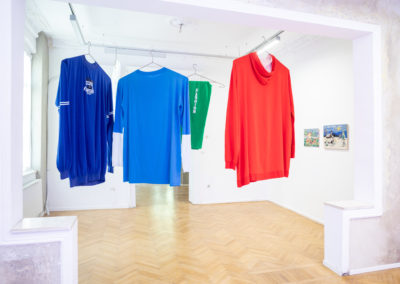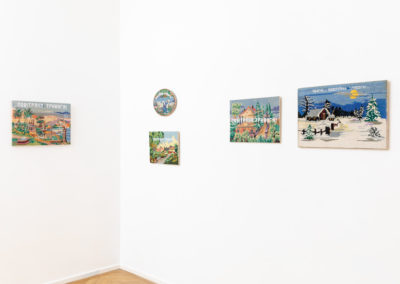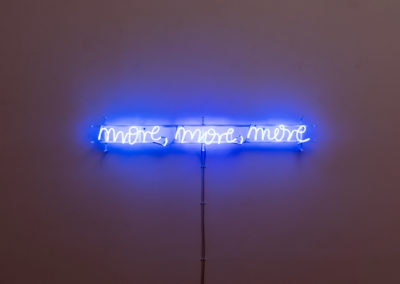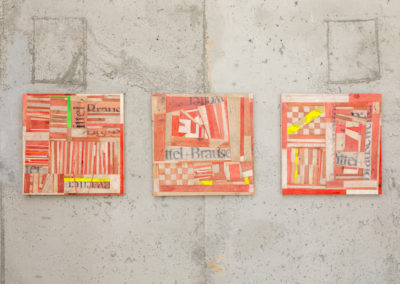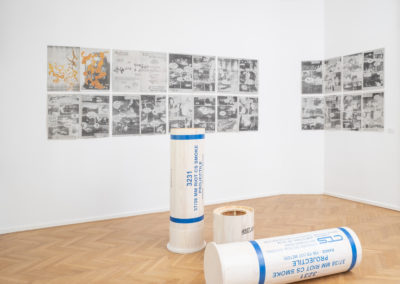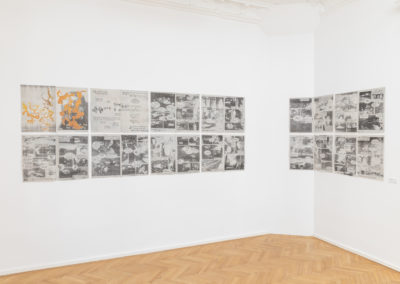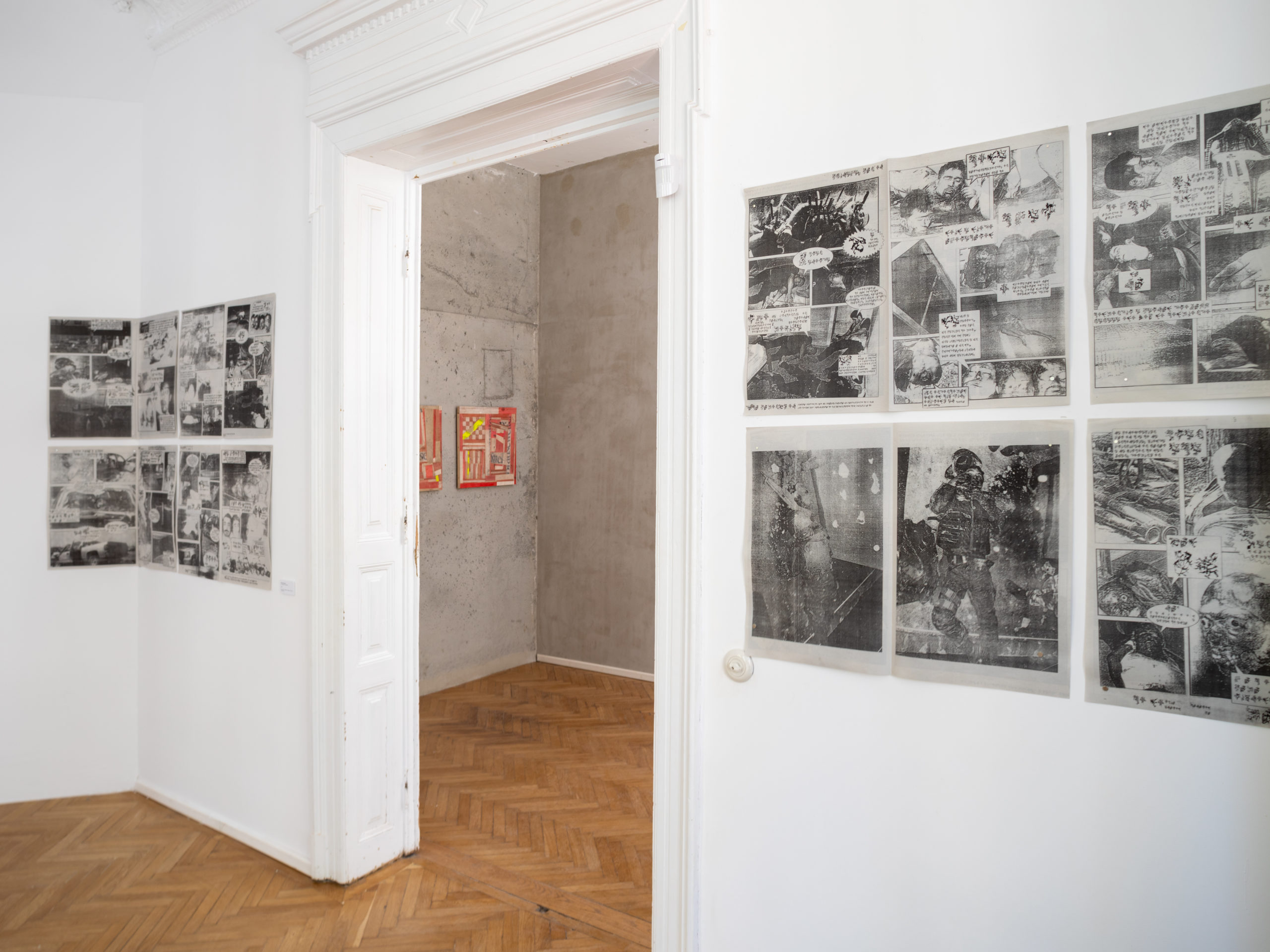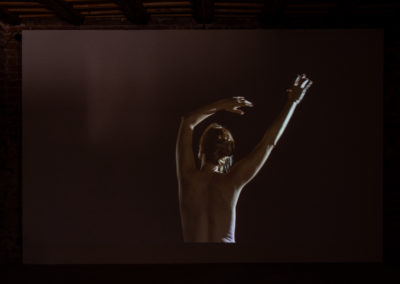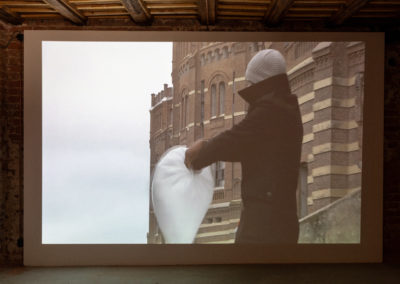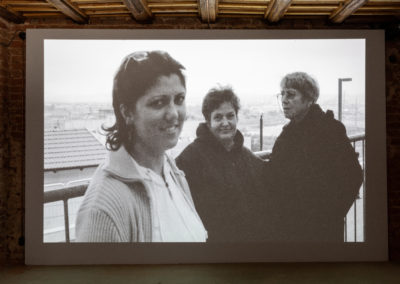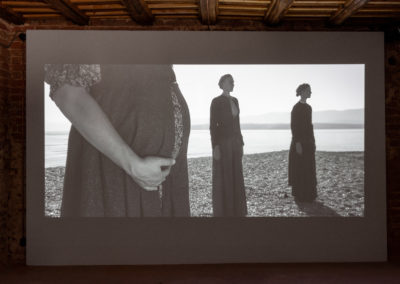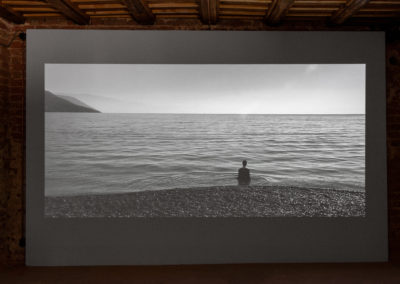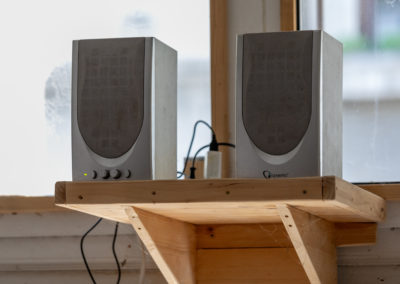Carlos Amorales (*b 1970, MX) studied visual arts in the Gerrit Rietveld Academie and the Rijksakademie van Beeldende Kunsten, both in the city of Amsterdam, Netherlands. The most extensive researches in his work encompass Los Amorales (1996-2001), Liquid Archive (1999-2010), Nuevos Ricos (2004-2009), and a typographic exploration in junction with cinema (2013-present). He exhibited recently in Romania at the Art Encounters Biennial 2023, with a satellite solo show at the National Museum of Contemporary Art in Bucharest.
Ovidiu Anton (*b. 1982, RO) currently works and lives in Vienna, where he graduated from the Academy of Fine Arts in Vienna having previously studied at École Supérieure des Beaux-Arts in Marseille. The artist works with film and videoart, performance, drawing and sculptural objects. His works often take on a political character, seeking and highlighting the paradoxical nuances of the surrounding world.
Valentina Avanzini (*b. 1995, IT) works at the threshold between curatorial, artistic and research practices, having defended her thesis on art and intimate spaces as public spaces with curator Luca Cerizza at the Visual Arts and Curatorial Studies at NABA – Nuova Accademia di Belle Arti for her MA. She is currently pursuing independent research on the topic of woven histories through lullabies seen as forms of feminine counter-narratives with theoretical findings already presented in international conferences during 2022-2023, such as Berceuses.
Matei Bejenaru (b. 1963) works with photography, video, performance and inter-media installations, in long-term projects that explore both the poetics of imagery, as well as the social, documentary aspect of social shifts during the last three decades in Romania. Matei Bejenaru’s works were part of important exhibitions in events and institutions such as Tate Modern London,49th Venice Biennial Venice, Museum Europäischer Kulturen, Berlin;The Drawing Room London, Taipei Biennial, Taiwan; Athens Biennial, Futura Art Center Prague and Prague Biennial 3, NGBK Berlin, Ludwig Museum, Budapest,The National Museum of Contemporary Art.
Orit Ishay (*b. 1961, IL) focuses on photography, video and neon installation. In her work she explores human-place relations and interactions, and seeks to raise social and mental questions by focusing on the ways identities are constructed. Ishays’ representations of reality is seductive, deceptive, and aesthetic.Her work has been shown in solo and group exhibitions. In numerous contemporary fine art museums and art institutions. Her works are in public and private collections such as Israel Museum Jerusalem, MUMOK Museum of Modern Art Vienna, MOCAK Museum of Contemporary Art Krakow, The Israeli Center for Digital Art Holon, among others.Ishay is a senior lecturer of photography at the Sapir Academic College School of Art.
Zhanna Kadyrova was born in 1981 in Brovary, in the Kyiv region, Ukraine, where she currently lives and works. She graduated from Taras Shevchenko State Art School and received the Kazimir Malevich Artist Award, the Sergey Kuryokhin Modern Art Award for Public Art, the Grand Prix of the Kyiv Sculpture Project (all 2012) as well as a PinchukArtCentre Special Prize (2011) and Main Prize Winner (2013).
Renata Poljak (*b 1974, HR) graduated from the School of Fine Arts in Split and continued her post-graduate studies at École Régionale des Beaux-Arts in Nantes, France. She was the recipient of the ArtsLink scholarship at the San Francisco Art Institute (US) where she was a visiting artist and mentor to post-graduate students in 2002. The artist’s work of film, video, installation art and photography has been exhibited widely, in important institutions, biennales and film festivals.
Poetics of Hospitality. Vol. II
Artists: Carlos Amorales, Ovidiu Anton, Valentina Avanzini, Matei Bejenaru, Orit Ishay, Zhanna Kadyrova, Renata Poljak
09.09 – 20.10.2023
Curated by Cristina Stoenescu & Anastasia Palii
Anca Poterasu Gallery, Bucharest
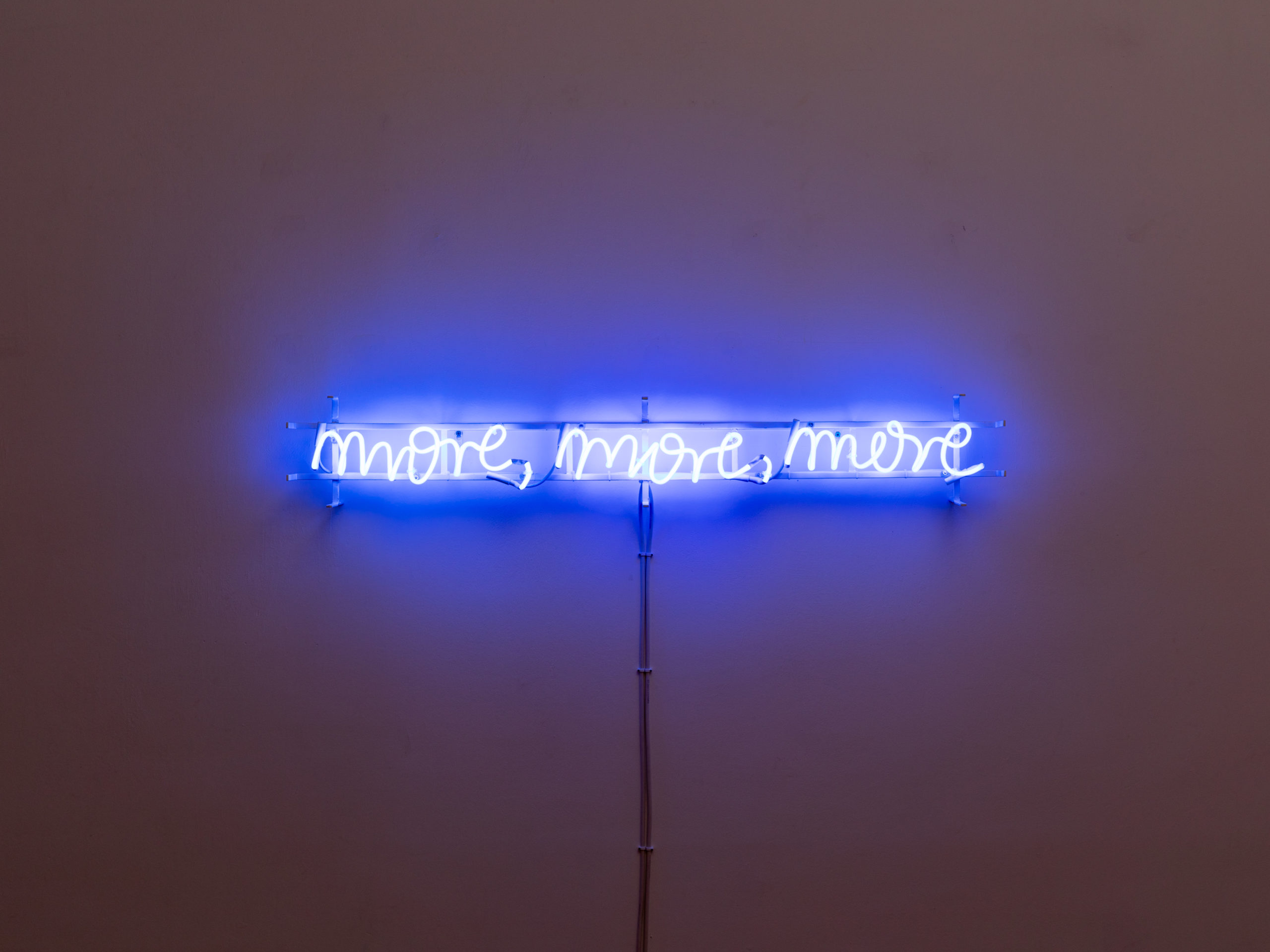
Exploring themes of memory and loss, migration and displacement, the group exhibition adopts multiple perspectives from differing economic and geopolitical contexts. Through the artworks the exhibited artists, the show resurfaces an ocean of communicating experiences across geographies of alienation and violence, timelines of war and peace that leave traces across imaginary borders, but also invisible lines that connect and shapes lines of empathy. Taking as reference point Derrida’s concept of hospitality, the exhibition Poetics of Hospitality reflects the unavoidable ambiguities and contradictions inherent for this term, which is close to meaning has a semantic proximity to the concept of power through the influence exerted on the Other – migrant/stranger, and which implies an ethical and political dimension.
The selection of works is an interplay of various artistic media that reflect the dynamics of power relations surrounding the phenomenon of migration: inter-ethnic conflicts, the abusive effects of neoliberal policies in a global economy, the devaluation of the unaccounted for female labour force in impoverished countries. Helplessness, anxiety and injustice transit the human consciousness and take the form of fluid, almost non-translatable languages of resilience in confronting the imminent war, the media violence or the social inequity. These are artistic endeavors of reclaiming a safe ideal of a “home”, but also the right to human dignity in a hierarchical social order. A kaleidoscopic image of an alienating society, filled with insecurity but also with excesses, and a culture of exile within and beyond its borders is thus shaping.
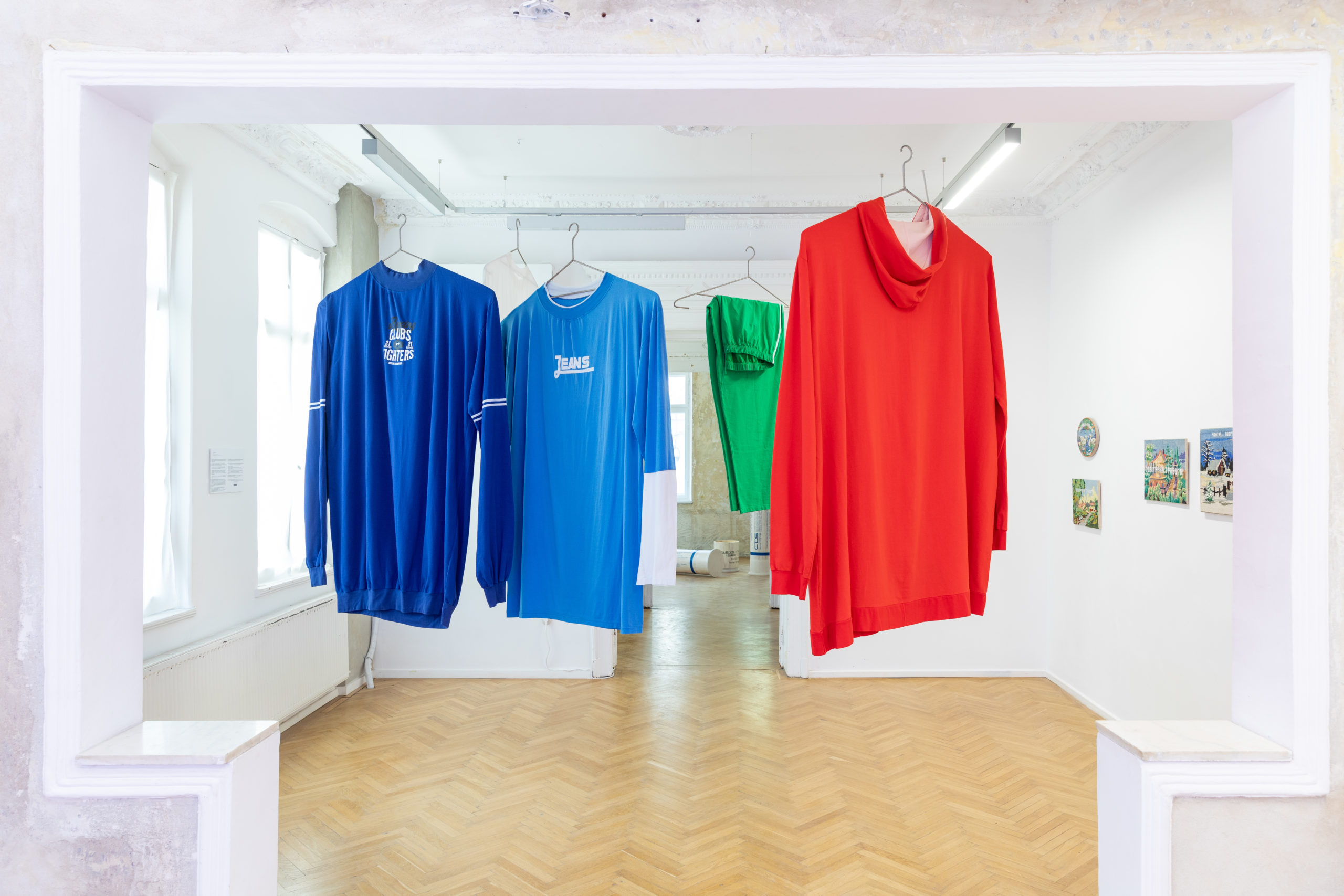
The connections between the artworks emphasize both the loss and the implicit and explicit violence of forced migration, be it from economic, political, or social reasons. Individual images and stories of geopolitical or economic permutations impose new realities felt both across borders and in the home-in-the-past, individual temporal perspectives, but brought together in a chorus of experiences felt at a generational level, as highlighted by Valentina Avanzini’s research centered on the lullabies of women who left for Italy or as presented in Matei Bejenaru’s film “From far away”, in direct connection with economic migration in the Romanian context, with a focus on domestic work far from one’s own families.
The dialogue in the exhibition broadens to a more global scale with the work of Ovidiu Anton, who aptly underlines the permanence of migratory phenomena, but also the constant unreadiness of social and political systems in supporting the pressures of these unavoidable changes. The artist has a long-term focus on retrieving symbols of the formal, ubiquitous system of marking borders and fears, such as border control posts, fences and pieces of wall-building across countries and histories. Through his sculptures, showing enlarged cartridges of bullets or fragments of no-trespassing signaling, the artist allows to reconsider a common visual language of transforming lines on the map in unmovable obstacles. His works allow a context through which the viewer can consider the alienating consequences of current political systems, as well as showing how the world functions as a construct that can hopefully be altered and made more human.
Walking through the exhibition space, one is confronted with the silk-printed editioned work of Carlos Amorales titled ”La Lengua de los Muertos” (2010). The pages contain graphic images drawn from the local media in Mexico, of a seemingly unending war, whose language is no longer translatable or understandable. It shows itself as a point of no return, a publication that can be read no longer in this life, but perhaps in the next one, through the alphabet especially developed by the artist. Untranslatable and unreadable, the voices and the stories of the anonymous faces can only carry on a mysterious and silent recording of their end. In stark contrast with these images, yet melancholically so, the research sound recordings of Valentina Avanzini fill in the empty space in the gallery. One selected lullaby is played in the open space from time to time, pertaining to Paraschiva Cioban, with her permission, as one of the thousand Romanian workers, now living and working in Italy since 2005 raising and taking care of children and the elderly in order to provide for her own family back home. In the same breath, the viewer can see Renata Poljak’s neon lettering ”more, more, more” as a sort of incantation which retrieves multiple associations of longing and missing and being missed.
Across the room, the viewer is confronted with the mathematical reality of underlaying exploitative systems that create vicious circles of economic inequalities. In his work, Matei Bejenaru demonstrates through his installation ”Enlarged Clothing” (2005) how the salary of a Romanian worker at the time was 8 times lower than the income of a similar worker in Europe, by creating the oversized clothing that would match the wage gap. The oversized sculptural grouping of clothing is presented next to the series of interventions of found embroideries by artist Zhanna Kadyrova, who juxtaposes peaceful-looking sceneries with words announcing warnings against imminent air strikes. A part of the same series is currently on display at the Pinchukartcentre until February next year, in the solo show of the artist in Kiev, the selection within the gallery space further connects to the first show of the Poetics of Hospitality series, the solo show of the artist Orit Ishay who presented a series of pixelated photographs of her own grandmother’s embroidery work. The continuity between the communicating shows that marks a year-long artistic and curatorial search on the topics of migration, memory and home is furthered by Orit Ishay’s video work ”Chocolat” (2015) included in the present group show. The film scenario plays with the idea of fictional and historical facts, in an uncanny approach to the invisible links between racism, colonialism and war crimes.
Within the same cinematic space of the gallery, the viewer can further see the films ”Porvenir” (2020) and ”Partenza” (2016) by artist Renata Poljak, which allow the exhibition to come full-circle, with a discrete, yet surreal experience of a quiet presence in the room, looking towards the sea, offering an intimate experience of melancholy, of images that create memory-places, connecting fear with the hope of return, the impermanent with the safety of that which remains. These are images of rootlessness and displacement, calling into question matters of identity and territories, in a metaphor of nomadic spaces, without shelter, utopian or transitory areas interwoven on a shared map.
The project Poetics of Hospitality. Vol II is co-funded by the National Cultural Fund Administration. Our thanks to the Artis foundation for supporting the work of artist Orit Ishay in the ”Poetics of Hospitality” series of shows this year.
The project does not necessarily represent the position of AFCN. AFCN is not responsible for the content of the project or how the results of the project may be used. These are entirely the responsibility of the grantee.
ARAC is a non-profit organization founded in June 2012, in order to produce and promote contemporary art in Romania and abroad. The initiative of the 58 Plantelor Residency belongs to Anca Poterasu, gallerist and ARAC President. The first edition of the Residency took place in 2015 and it was financed through a grant offered by Norway, Iceland, Liechtenstein and the Romanian Government.

